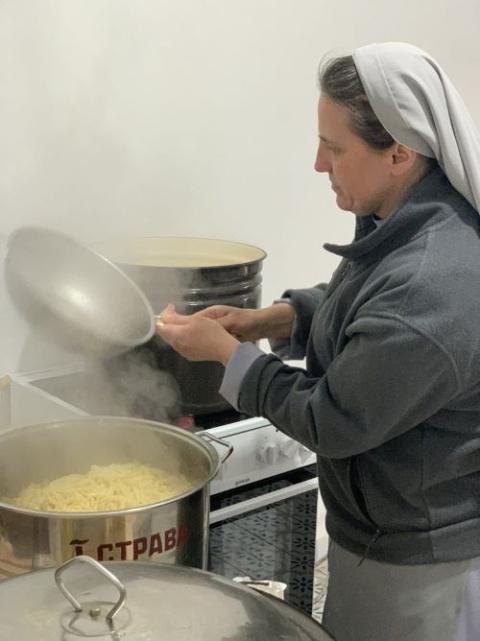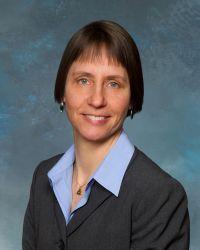A nun carries humanitarian goods to be loaded onto trucks as first aid transport to Ukraine at the Basilica of Santa Sofia, a religious and cultural center for Ukrainian expatriates in Rome, on March 3. (CNS/Reuters/Guglielmo Mangiapane)
As always, when people are suffering, women religious are there to help.

The latest example is the Caritas Sisters of Jesus, who are helping World Central Kitchen serve Ukrainian refugees after they cross the border into Poland. Chef José Andrés is the founder and "Chief Feeding Officer" of World Central Kitchen, which partners with restaurants, food trucks and chefs to feed people in crisis.

Caritas Sister Ukraine: A Caritas Sister of Jesus prepares meals for refugees from Ukraine arriving in Poland as part of the World Central Kitchen's work to feed people in crisis. (Courtesy of World Central Kitchen)
Andrés tweeted photos Feb. 28 of the hot meal distribution, writing that World Central Kitchen is partnering with the Caritas sisters at two border crossings. The group is also working at a border crossing into Romania and is operating inside Ukraine in Kyiv, Lviv and Kherson.
If you're wondering how to help the people suffering in Ukraine, Sr. Ann Laszok, a Sister of the Order of St. Basil the Great, has resources. Laszok is a member of the Patriarchal Catechetical Commission of the Ukrainian Greek Catholic Church and a provincial councilor of her community, which has several sisters ministering in Ukraine.
"First and foremost you can pray for peace," Laszok wrote in an email. "Then you can spread the truth to counteract the disinformation propagated by Russia. Ukraine is not the aggressor. Ukraine is a peaceful nation."
And you can donate to:
- The Sisters of the Order of St. Basil the Great;
- The Ukrainian Catholic Archeparchy of Philadelphia;
- The United Ukrainian American Relief Committee; and
- Caritas Ukraine.
In addition, Salesian Missions has launched a relief fund specifically to provide shelter, nutrition and supplies to refugees in Ukraine and surrounding countries.
Turning property into tools of change
Religious and their stakeholders interested in how capital assets such as land and buildings might be transformed into tools of change can go in-depth on the topic with a five-part series hosted by Nuns and Nones.
Aimed at building climate-resilient communities, repairing racial harm and ensuring no one is left behind, Nuns and Nones' Land Justice Futures series will uncover "new models for land transitions that are creative, collaborative, and courageous — while still caring for communities' real needs," according to a registration email.
Advertisement
The five sessions will focus on the unjust roots of the private land and real estate system; the next generation of land stewards and how landowners can collaborate with them; how land access is crucial to the climate justice movement; and the financial, legal, and technical options available.
Sessions are 90 minutes and start at 4 p.m. Eastern Standard Time March 10, March 24, April 7, April 21 and April 28. Panelists will include partners in the Shinnecock Kelp Farmers project; Sr. Priscilla Solomon, a Sister of St. Joseph of Sault Ste. Marie and a member of the Ojibwe of the Anishinabek Nation; and Dominican Sr. Sharon Zayac, a co-founder of Jubilee Farm.
Those who cannot take part in the series can download Nuns and Nones' three-part series of guidebooks examining the core themes of land justice: reparations, landback, and regenerative stewardship and collective ownership. More than 30 sisters, associates, co-members and staff were consulted in the process of creating the series, which is available for free download.
New book examines the question of women deacons
Women Religious, Women Deacons: Questions and Answers by Phyllis Zagano is now available.
Catholic scholar and author Phyllis Zagano speaks during a Jan. 15, 2019, symposium on the history and future of women deacons at Fordham University's Lincoln Center campus in New York City. (CNS/Gregory A. Shemitz)
The book expands upon a five-part series published by Global Sisters Report in 2021 and includes questions for personal consideration or group discussion and discernment that were written and reviewed by Sr. Donna Ciangio, a Dominican Sister of Caldwell, New Jersey, who also wrote the book's forward; Sr. Colleen Gibson, a Sister of St. Joseph of Philadelphia; and Sr. Irene Kelly, Religious of the Sacred Heart of Mary. Questions were also gathered from a Feb. 12, 2021, "Witness & Grace Conversation" with Zagano, Gibson and GSR editor Gail DeGeorge.
"In these chapters, Dr. Zagano creates space for women religious to discern the questions surrounding the possibility of women religious being ordained," Ciangio writes in the foreword.
Zagano is an internationally acclaimed Catholic scholar and lecturer on contemporary spirituality and women's issues in the church, author of multiple books, and part of Pope Francis' initial papal commission for the study of the diaconate of women.
Women Religious, Women Deacons is $4.95 in paperback or $3.32 for an e-book and can be ordered or downloaded from Paulist Press.
One way to learn how satisfied sisters are with religious life
A second session at Catholic Theological Union in Chicago will examine how an assessment tool designed by a Sister of Divine Providence can be used to assess life satisfaction among sisters.

Sr. Maria Clara Kreis
Sr. Maria Clara Kreis created the Life Satisfaction Scale for Apostolic Women Religious, an intergenerational and international assessment tool designed to provide information to individuals and congregations about their levels of satisfaction as apostolic women religious. Kreis writes that a survey of more than 1,100 sisters found that "ministry satisfaction is an essential aspect of sisters' life commitment to God, their community, and the charism of religious life."
The virtual session, at 4 p.m. Eastern time March 16, will show how the scale can be used to gain insights into sisters' satisfaction with their lives, work, spirituality, and commitment, individually and communally, and can assist religious worldwide as they seek to transform religious life for the future. This session will feature Kreis and Debra Moore, a quantitative research methodologist.







